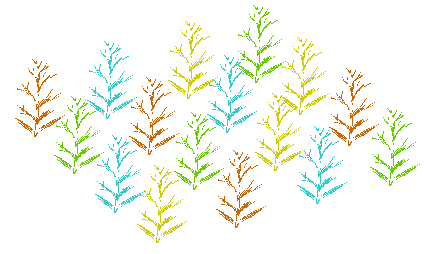|

The Randomized Complete Block design (RCB)
The RCB is the standard design for agricultural experiments. The field
or orchard is divided into units to account for any variation in the
field. Treatments are then assigned at random to the subjects in the
blocks-once in each block.
Field marks:
- Treatments are assigned at random within blocks of adjacent subjects, each treatment once per
block.
- The number of blocks is the number of replications.
- Any treatment can be adjacent to any other treatment, but not to the same treatment within the block.
- Used to control variation in an experiment by accounting for spatial effects.
Sample layout:
Different colors represent different treatments; each
horizontal row represents a block. There are 4 blocks (I-IV) and 4
treatments (A-D) in this example.

Block I A B C D
Block II D A B C
Block III B D C A
Block IV C A B D
ANOVA table format:
Source of
variation |
Degrees of
freedoma |
Sums of
squares (SSQ) |
Mean
square (MS) |
F |
| Blocks (B) |
b-1 |
SSQB |
SSQB/(b-1) |
MSB/MSE |
| Treatments (Tr) |
t-1 |
SSQTr |
SSQTr/(t-1) |
MSTr/MSE |
| Error (E) |
(t-1)*(b-1) |
SSQE |
SSQE/((t-1)*(b-1)) |
|
| Total (Tot) |
t*b-1 |
SSQTot |
|
|
| awhere t=number of treatments and b=number of blocks or replications. |
Sample ANOVA table:
Source of
variation |
Degrees of
freedom |
Sums of
squares (SSQ) |
Mean
square (MS) |
F |
| Blocks |
3 |
26.36 |
8.79 |
1.36a |
| Treatments |
3 |
216.23 |
72.08 |
11.19a |
| Error |
9 |
57.95 |
6.44 |
|
| Total |
15 |
300.54 |
|
|
| aF test with 3,9 degrees of freedom at P=0.05 is 3.86 |
Sample SAS GLM statements:
PROC GLM;
CLASS BLOCKS TREATS;
MODEL WHATEVER = BLOCKS TREATS;
RUN;
Compare with:
Washington State University
Tree Fruit Research and Extension Center
1100 N. Western Ave.
Wenatchee WA 98801
phone: 509-663-8181
fax: 509-662-8714
Copyright © Washington State University
Disclaimer
WSU Electronic Publishing and Appropriate Use Policy
Comments concerning this page to
webservant@tfrec.wsu.edu
Friday, August 25, 2000
| 
